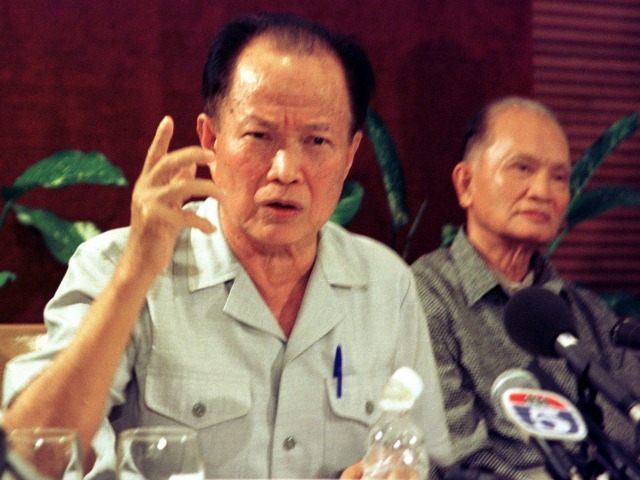Witness Meu Peou told a court during an ongoing genocide hearing in Cambodia about a woman the Khmer Rouge executed and ate in front of him.
“She was asked to take off her clothes and her body was cut open,” he wept to the court. “There was blood everywhere. … [H]er liver was taken out and was cooked for a meal.”
The testimony occurred at a “genocide hearing of ‘Brother Number Two’ Nuon Chea, 89, and the former head of state Khieu Samphan, 84.”
Authorities under these men arrested Meu Peou when “he was just a boy.” The state claimed he betrayed “the hardline communist cadres by stealing rice.” He lost over seventeen relatives during the regime. His father starved to death because, as a Muslim, “he refused to eat pork.”
“I had to force myself to eat pork so I could survive,” he added.
During the regime, Pol Pot held the highest title as general secretary. Nuon Chea served as Cambodia’s prime minister, making him Pol Pot’s second-in-command. Khieu Samphan ruled as head of state and the president of the State Presidium.
A court convicted the two men of crimes against humanity in 2014. They face charges of ethnic cleansing in this UN-backed court, which includes deaths of 20,000 Vietnamese and 500,000 Muslims.
“What I want to say today and what I want my countrymen to hear is that as an intellectual I have never wanted anything other than social justice for my country,” declared Khieu Samphan at the court last week. “I shall shout loudly that I never wanted to agree to any policy that is against the Cambodian people.”
Serving as chief ideologist, he is believed to have played an integral part in shaping the Maoist regime’s radical thinking.
Prosecutors say Nuon Chea was one of a small group behind policies that drove city residents into forced labour and starvation in the countryside, and used systematic violence against perceived enemies of the regime.
….
During his time in office, Khieu Samphan was the public face of regime and accompanied overseas diplomats on official visits.
Like Nuon Chea, he is accused of helping sculpt some of the regime’s deadliest policies as one of its top leaders.
“He publicly endorsed taking measures against the enemies of the revolution in a way that suggests knowledge and support of the policy of executing purported enemy agents,” Stephen Heder and Brian Tittemore wrote in their book, “Seven Candidates for Prosecution.”
Last month, another witness told the court he saw “Khmer Rouge soldiers slit prisoners’ throats and [eat] their gall bladders.” They blasted music through the speakers to drown out the murders.
“While I was tending cows and buffaloes, I could see how prisoners were killed. Most of them had their throats slit,” described Meas Sokha. “Two (Khmer Rouge guards) would hold a prisoner tight and another would slit the throat of the prisoner.”
He added, “Whenever there were killings, the guards would drink wine together with gall bladders. I knew these gall bladders were from humans. There were many gall bladders dried in the sun near the fence.”
In April, Ouk Him described the murder of a pregnant woman:
“One day, there was a pregnant woman detained at the prison with me and she felt a stomach pain as she was due to deliver a baby. The Khmer Rouge cadre in charge at the prison brought her out of the detention cell,” Ms. Him said.
After the woman was marched onto the grounds of the prison, in Takeo province’s Tram Kak district, Ms. Him said, piercing screams could be heard through the walls of her cell. Then silence.
“I saw a Khmer Rouge cadre who walked her out come back into the detention cell. Upon his appearance, he raised up his hand with a human liver and heart and shouted, ‘Here’s the liver and heart from that woman. Let’s eat and drink it with alcohol,’” she said.
Pol Pot led the Khmer Rouge regime between 1963 and 1981. The regime committed genocide between 1975 and 1979, when they sought to install the purest form of communism in the world, leaving one to three million people dead. The country lost 25% of its population from torture, malnutrition, executions, disease, and forced labor.

COMMENTS
Please let us know if you're having issues with commenting.